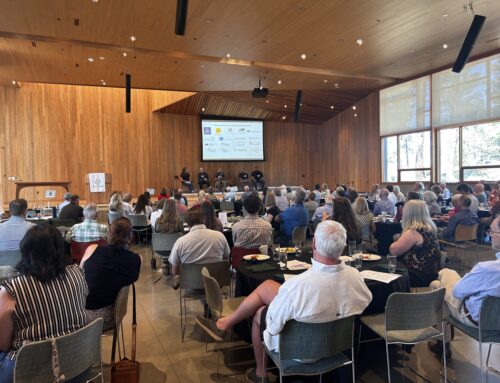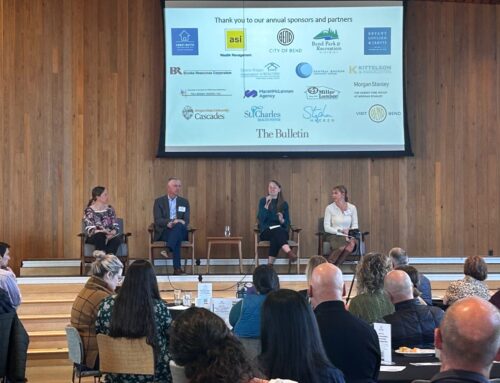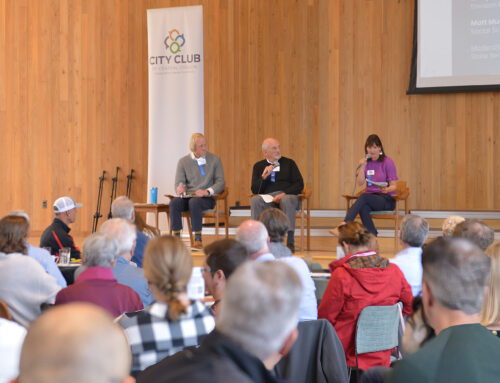LISTEN TO THE FORUM:
May 16, 2024
Most of us will only ever interact with Oregon’s child welfare system through a news story, however this system is far more interconnected and intricate than most people perceive. The purpose of the system is to support children by preserving the connection between children and their families.
Moderator and Executive Director at CASA of Central Oregon Heather Dion opened the forum with five common myths about foster care and child welfare:
- Children should be “rescued” from “abusive” parents. It’s more nuanced than that. Most parents with children in foster care care deeply about their children but face challenges — including substance abuse, mental illness, domestic violence, inadequate housing, and poverty — that interfere with their ability to meet basic needs and keep their children safe.
- Children in Oregon in foster care live in hotels. The first priority is always to put children into homes with friends or family they know and, when that’s not available, they will move into a foster home. On occasion, temporary lodging is used but the system works really hard to keep it brief and to a minimum.
- Foster parents are abusing the system by taking money. Children are often placed with someone they know well and that may be a person who never expected to become a foster parent. Additionally, stipends rarely cover the full cost of caring for a child.
- The point of foster care is adoption. In Oregon only about 20% of cases close in adoption. Around half of cases end in the primary goal of parent reunification, 15% end in guardianship, and the remainder end in emancipation or aging out.
- The issue of children in foster care doesn’t affect me. Our community has a vital role in preventing abuse, supporting families, and helping children heal and thrive. There are a number of resources included below for people to stay informed and get involved, including KIDS Center prevention trainings. Call 855-503-SAFE (7233) to report abuse or neglect of a child or adult in Oregon.
An abuse/neglect hotline report that meets the criteria is sent to Child Protective Services for further assessment. Deschutes County Child Welfare Supervisor Amy Martin stesses that research shows that children do better with family and her team’s main objective is to provide the family with supportive services in their home environment so they can meet/exceed a minimum level of standard of care. For example, natural supports could be reliable friends or family who can assist with monitoring and changing behavior to help keep children safe.
A legal case is only filed when all other options have been exhausted. Under the Adoption & Safe Families Act, the primary plan remains reunification while concurrent backup plans of adoption, guardianship, another permanent planned living arrangement (16+), and/or options with a fit and willing relative are also considered. Parents have 14 months to address a child’s safety concerns and work toward a plan of reunification. This process includes a family engagement meeting that centers on:
- Identifying the strengths/needs of the parents and children for intentional case planning
- Assessing in-home safety plan criteria: home-like setting, no barriers, willing parent, safety service providers
- Focusing on building up family’s natural supports: relatives, friends, kith/kin, neighbors, service providers, educators, etc.
“Our goal is to be there for a very short amount of time, provide the resources, provide the planning, provide the buildup of that natural support,” says Child Welfare Supervisor Joe Loeb. “Then we’re able to step away and have that family function without the need of a state government intervention. That is ultimately our goal.”
Flora Malcolm Layman credits J Bar J Youth Services for her smooth transition out of foster care at age 19. A self-described resilient and passionate person, this was Flora’s first time sharing her experience publicly, which she did to help raise awareness and reduce stigma around foster care.
“These children aren’t broken,” she says. “They’re not any lesser than children you may have, children you may know…these kids just need unconditional love and they have basic needs that weren’t met.”
Tune into the video above starting at 48:00 for audience Q&A, including the final question where each panelist shares what gives them hope.
Moderated by Heather Dion, Executive Director at CASA of Central Oregon
Speakers and Panelists:
- Amy Martin, Child Welfare Supervisor II for Deschutes County-Oregon Department of Health and Human Services
- Joe Loeb, Child Welfare Supervisor II – Permanency, Bend ODHS Office-Oregon Department of Health and Human Services
- Gabrielle Allender, Director of Client Programs & Prevention-Kids Center
- Paisley Pijuan, LCSW, Pediatric Behavioral Health Consultant-Mosaic Community Health
- Flora Malcolm Layman, J Bar J Independent Living Program Participant
Resources from the forum:
- FosterCareResourceGuide-New Nonprofits Added!
- May Slide Show-Presenter Slides
- Central Oregon groups meet to discuss local foster care system-Central Oregon Daily News
If you enjoy our forums, please consider making a donation by clicking here.


























